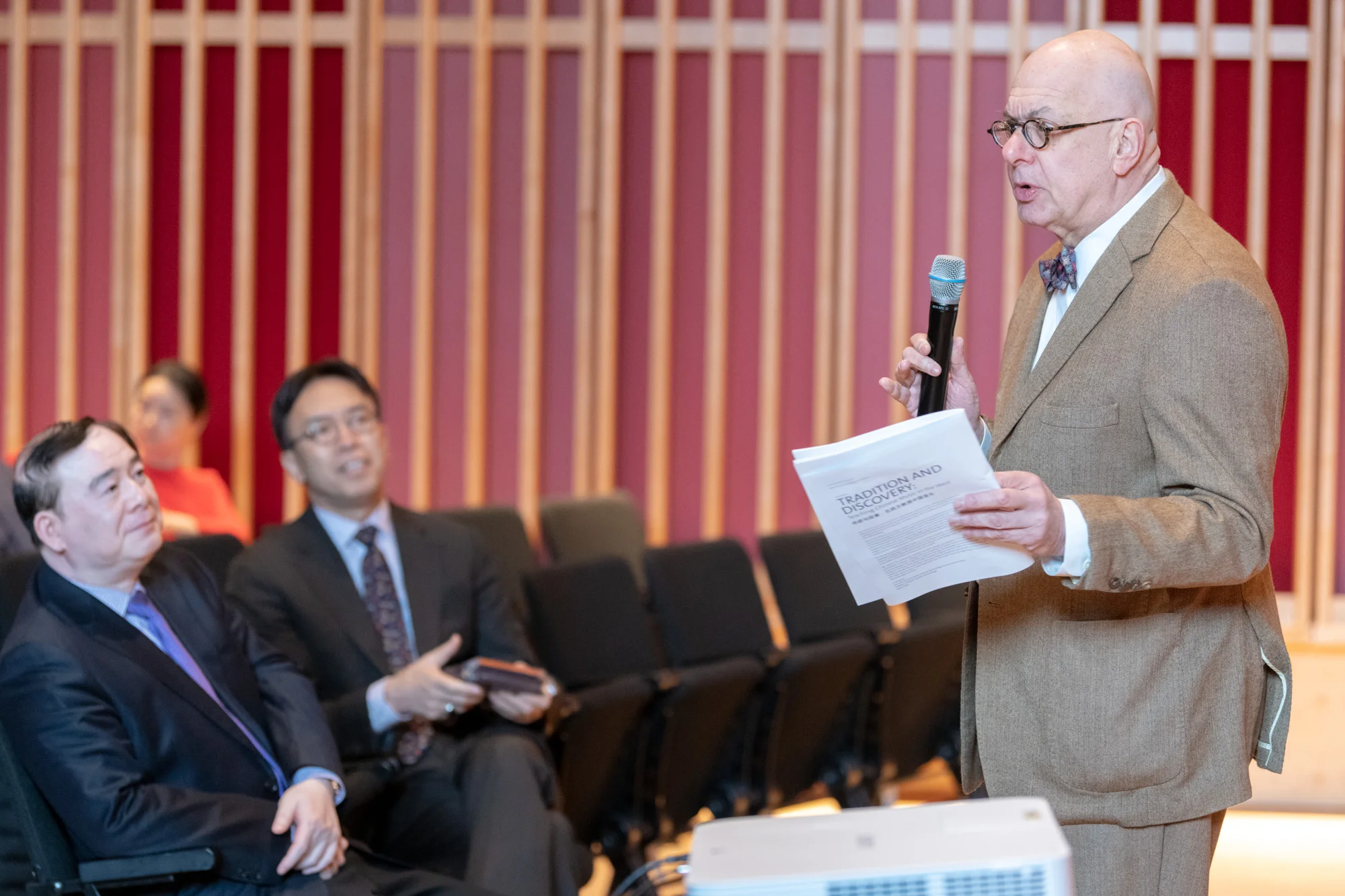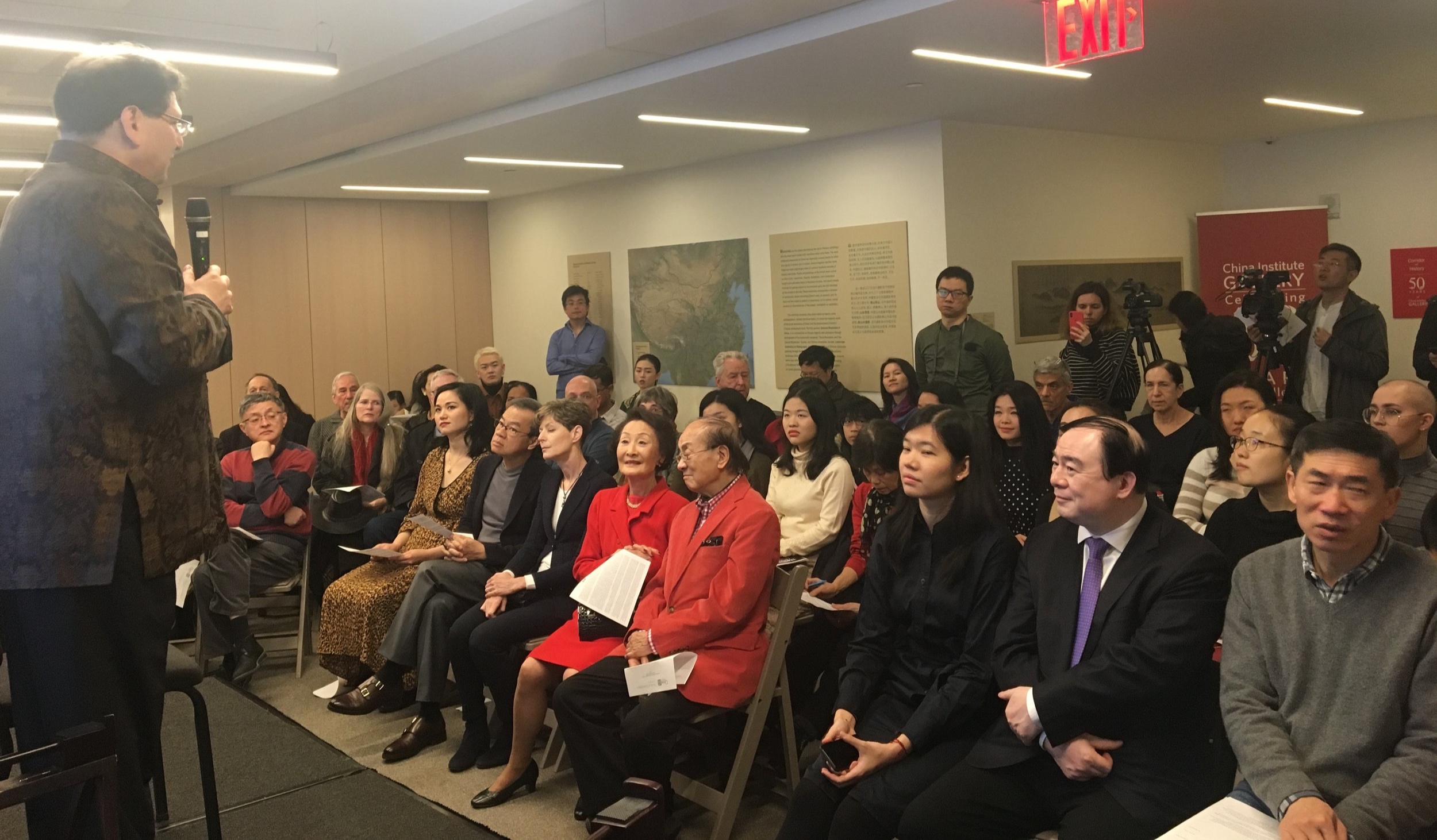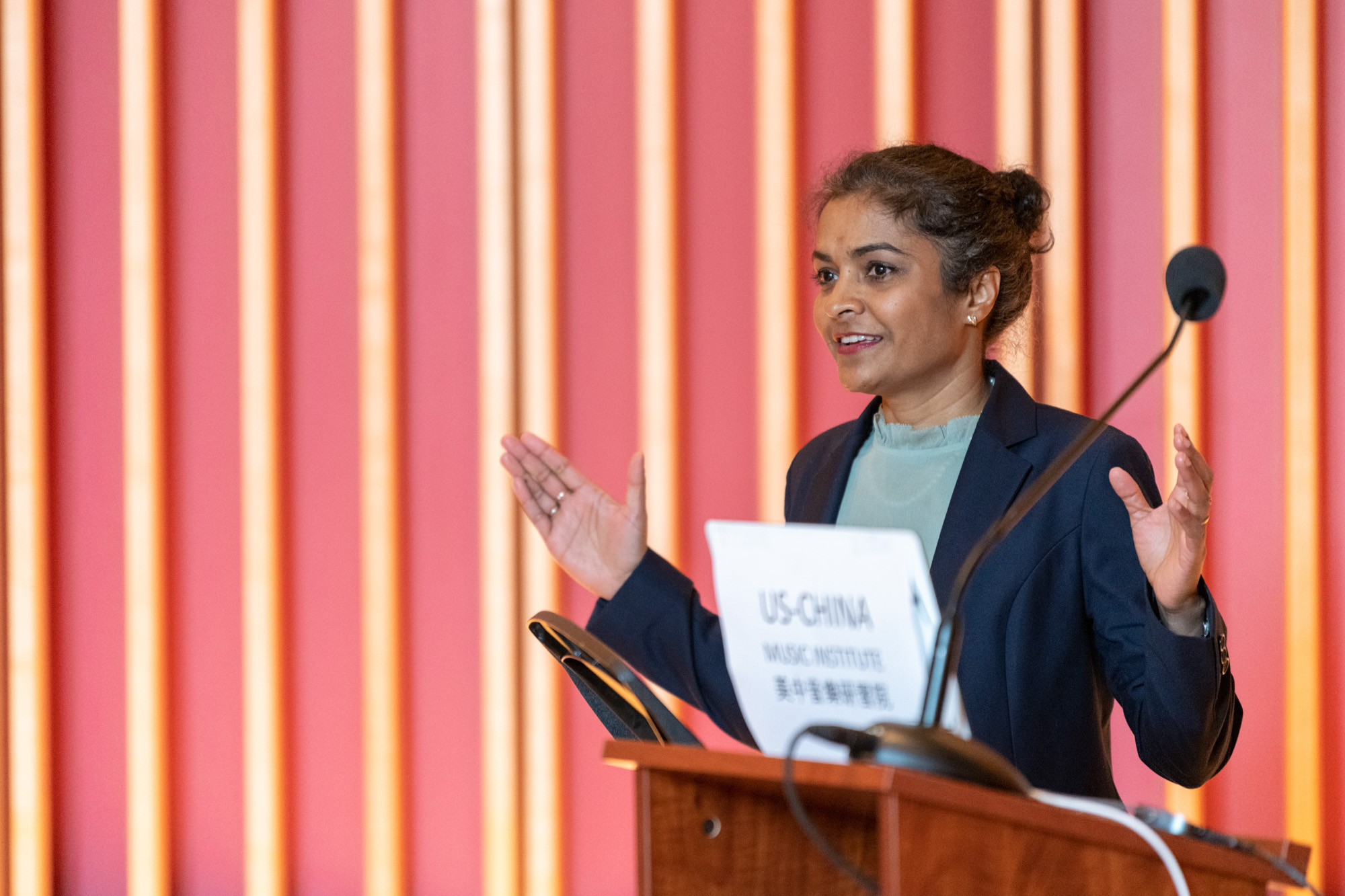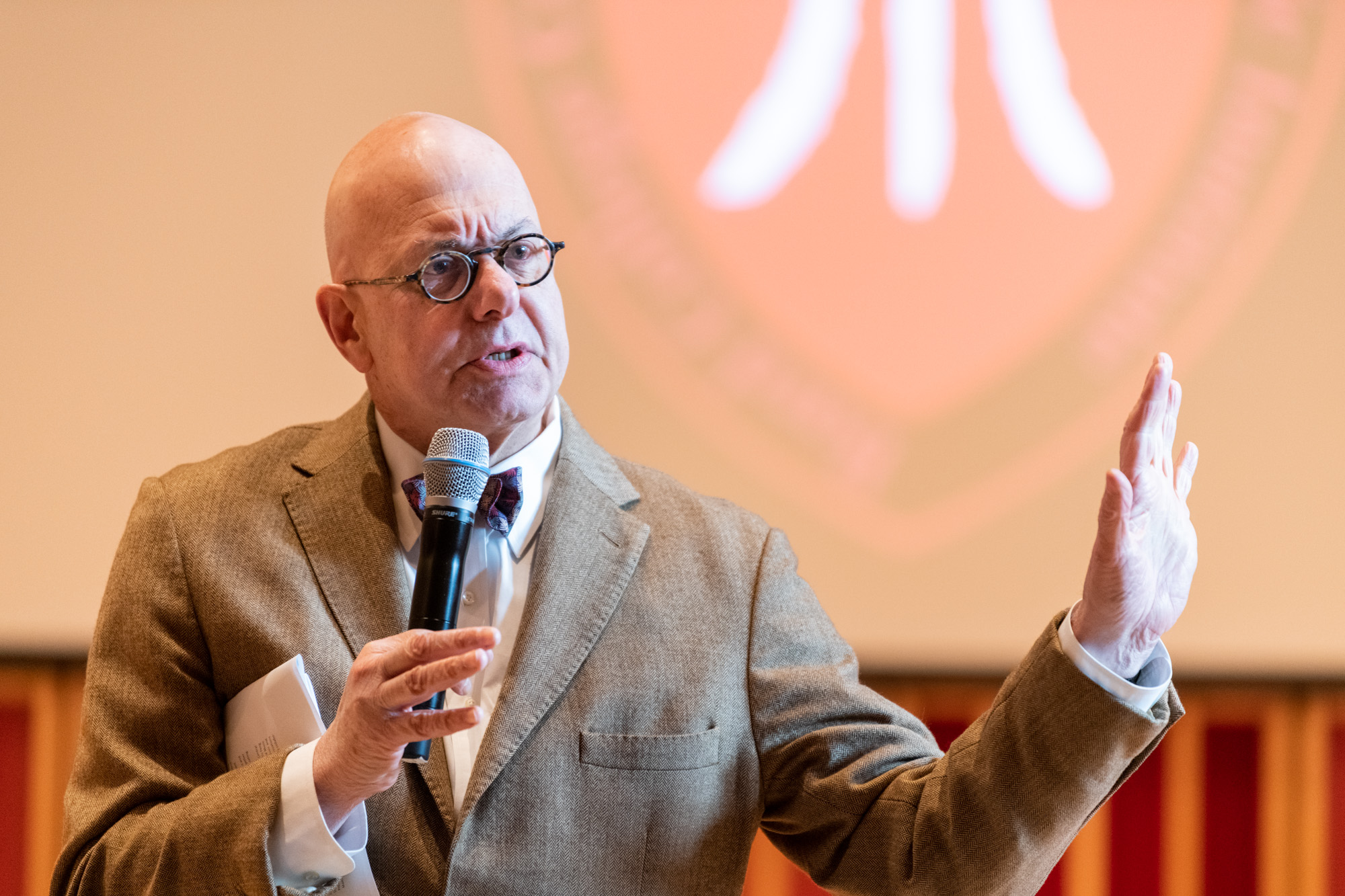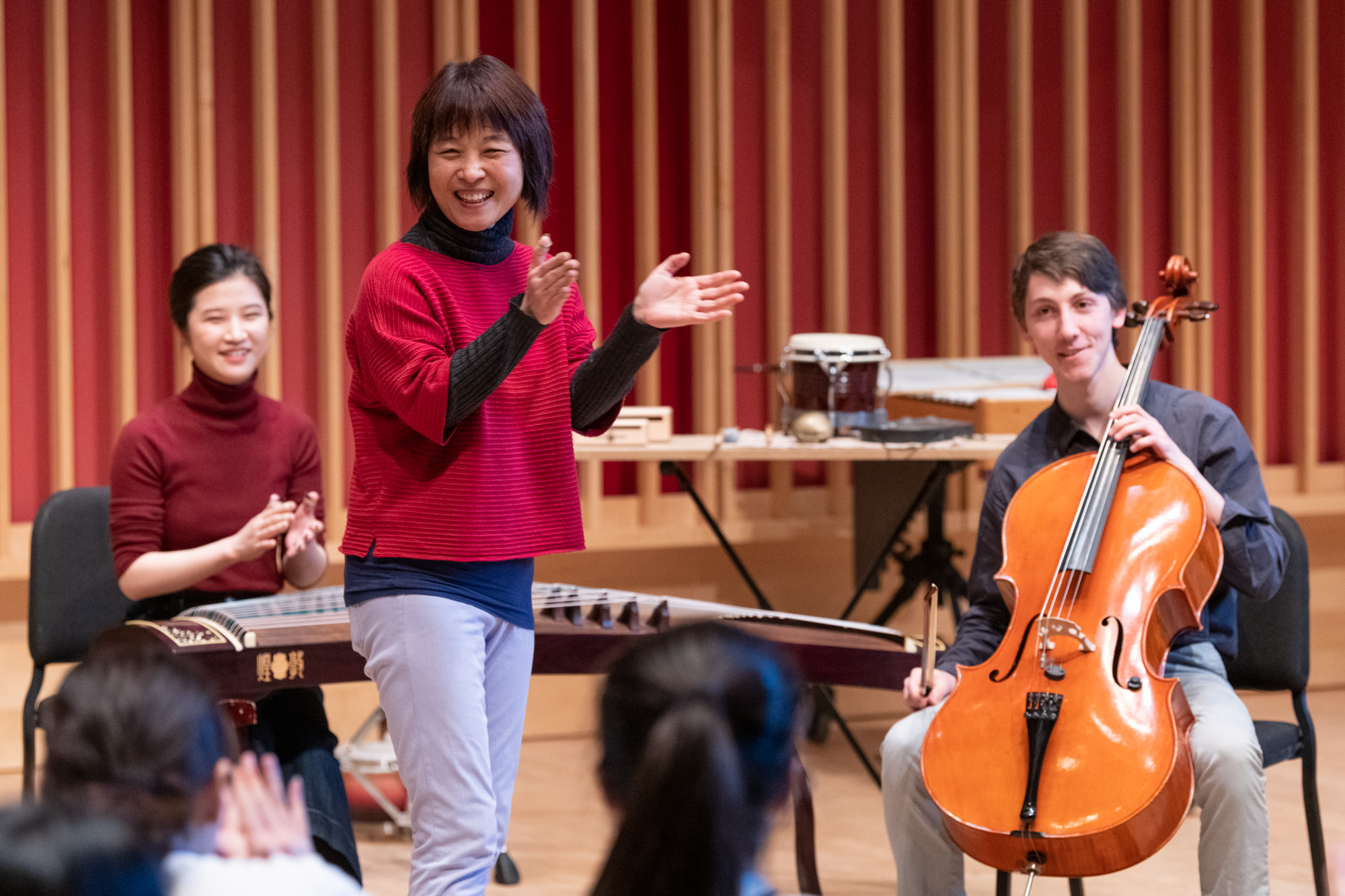On March 11-12, 2019, the US-China Music Institute of the Bard College Conservatory of Music convened a group of scholars, music educators and performers for our 2nd annual conference, Tradition and Discovery: Teaching Chinese Music in the West. With participants from Europe, North America, and Asia, the conference aimed to present diverse perspectives and experiences and to highlight successes and challenges within the field of Chinese music education outside of China.
Prior to the start of the conference, some of our attendees joined US-China Music Institute Director Jindong Cai at a NY Philharmonic concert at Lincoln Center, with Yo Yo Ma and Wu Man performing a concerto for pipa and cello by Zhao Lin, conducted by Long Yu. The evening also included works by Musorgsky and Tchaikovsky and was sold out even after three prior performances of the program that week. As an apt prelude to the conference, the concert pointed to the potential for a work featuring Chinese instruments and musical themes to reach an enthusiastic and diverse audience in the U.S.
Opening celebration of Music at China Institute 华美音乐
On the following day the US-China Music Institute co-hosted a pre-conference event at the China Institute in Manhattan to celebrate the opening weekend of our new collaboration, Music at China Institute 华美音乐. The event featured a talk by Dr. Yu Feng, president of the Central Conservatory of Music in Beijing, and lively performances on traditional Chinese instruments by US-China Music Institute teachers, students, and friends. The event was well attended and garnered significant interest from the local Chinese press. Music at China Institute 华美音乐 will for the first time add music education to the diverse offerings of the China Institute’s educational program and represents an important component of the mission of the US-China Institute to broadly expand access to and familiarity with Chinese music.
Once our speakers had reconvened up at the Bard College campus in Annandale-on-Hudson, NY, the conference officially began Monday morning with a welcome message by President Yu Feng of the Central Conservatory, expressing his appreciation for the co-presenters and attendees and for the ongoing partnership between CCOM and the Bard College Conservatory of Music. Director of the US-China Music Institute, Jindong Cai, opened the conference with a talk describing his experiences as a young musician in China, learning about the classical music tradition of the West, and then devoting much of his early musical career to studying and performing Western classical music. Cai went on to explain how he eventually felt compelled to better understand, appreciate, and interact with the musical traditions of his native culture, eventually leading to the creation of the US-China Music Institute in 2017. Cai posed that with the Institute still in its early stages, he hoped to both take a leadership role in connecting colleagues and presenting world-class opportunities for Chinese music and musicians, but also to learn from those who have long been working in the field and to find avenues for further collaboration and innovation.
Marianne Løkke Jakobsen of the Music Confucius Institute in Copenhagen
Continuing with the morning session’s focus on the creation of Chinese music programs in Western musical contexts, Marianne Løkke Jakobsen, co-director of the Music Confucius Institute of the Royal Danish Academy of Music in Copenhagen and a co-presenter of the conference, spoke about the challenges in defining the goals of the Music Confucius Institute. Jakobsen highlighted the open questions of who and what to teach to further Chinese music education, which would prove to be the predominant subject matter for many of the speakers over the next two days. Jakobsen’s demonstrations of the work at the Music Confucius Institute showed considerable ingenuity around experimentation, mixing instrumentation and compositional forms from Chinese and Western traditions, and exposing a largely non-Chinese student body, both at the Royal Danish Academy of Music and in Copenhagen’s schools, to many different ways of interacting with Chinese music.
Following Jakobsen’s presentation, the director of the Center for Chinese Music and Culture at Middle Tennessee State University, Han Mei, who was also a conference co-presenter, gave an overview of the Center’s facilities and many programs, including an impressive collection of Chinese instruments. She went on to discuss the for-credit Chinese Music Ensemble course that she has introduced on campus and how the aim of the course as well as the center is in part to challenge the Western-centric focus of music education. Han’s work aims to encourage more inclusive musical awareness and music making as a fundamental component of Western musical pedagogy.
Canadian educator and musician Gloria Wong, chair of the World Music Program of the VSO School of Music in Vancouver, brought into focus the question of how best to educate young people in Chinese music and proposed that the complimentary goals of ‘depth’ and ‘breadth’ could be achieved through a dual emphasis on musical technique and contextual learning about the musical traditions of China. Wong described and showed her work with the B. C. Youth Chinese Orchestra, and discussed the various opportunities for studying and performing Chinese music in Canada. Importantly, Wong pointed to challenges in finding appropriate learning materials and repertoire, an issue which would be brought up repeatedly throughout the conference.
Fellow second-generation Canadian Patty Chan, director of the Toronto Chinese Orchestra, described her own childhood discovery of Chinese music in Toronto in the 1970’s, when there was even less access to learning materials and diverse repertoire than there is now. Chan has made it her life’s work to bring opportunities for Chinese music learning and performance to kids, the local community, and professional musicians alike. In addition to forming ensembles for musicians of varying ages and abilities, she has also created learning resources in English and brought new repertoire from China as well as traditional pieces, to better reflect the variety of works that can be considered ‘Chinese music.’
Bard student Liu Chang performs a solo piece on erhu.
After lunch, the conference resumed with a performance by the four undergraduate majors in Chinese instruments at the Bard College Conservatory of Music. All four students are in their first year at Bard pursuing a double degree, one degree in music performance and the other in the liberal arts field of their choice. Next year they will be joined by a new cohort as the Institute builds its program and expands the opportunities for Chinese instrument majors to perform and collaborate with other students of the Conservatory. Talks resumed in the second session with three perspectives on teaching Chinese music in a liberal arts context.
A major theme of the talks during the Tradition and Discovery conference was how to define what should be considered Chinese music and what should be left out. Ethnomusicologist Su Zheng, of Wesleyan University, proposed an expansive view of Chinese music to include pop music and hip hop being created in China. While describing Wesleyan’s Chinese Music Ensemble and how it fit into the school’s music program, Zheng reasoned that any teaching of Chinese music should include the historical and cultural context of its creation. Therefore, any music created in the cultural context of China should be appreciated as a part of the Chinese musical tradition. Her talk also touched on the history of Chinese music in America, starting with performances for both Chinese and non-Chinese audiences in the late 19th century.
Like Zheng, professor of music W. Anthony Sheppard oversaw the creation of a Chinese Music Ensemble at his school, Williams College. He described numerous challenges, from keeping the ensemble going with a very small number of musicians, to making decisions about what sort of music should be considered part of the ensemble’s repertoire and whether they should include only traditional pieces or be more innovative in their programming. Sheppard also explained how the courses he teaches on Chinese music fit into the changing efforts of a liberal arts college to provide students with a particular context and perspective through which to view non-Western musical traditions.
The creation of the US-China Music Institute was the subject of the talk by Bard College Conservatory of Music Director Robert Martin. Starting with the story of Martin’s personal introduction to Chinese music during a time living in Taiwan in the 1970’s, he went on to describe how he became increasingly intrigued by the prospect of bringing Chinese music into the fold of a Western music conservatory and a liberal arts college, eventually embarking on the creation of the US-China Music Institute in 2017 with conductor Jindong Cai. Martin invoked a memory of a favorite passage from Hegel that inspired him, in which the philosopher encourages reading the classics in their original language as a way to virtually travel to distant lands. In the spirit of just such an immersive experience, the Institute aims to bring to Bard students an experience of the distinctive musical language of China, while also affording students of Chinese music the experience of a Western style liberal arts education.
Robert Martin’s talk ended the second session of the conference, and the attendees then broke away for two hours of tea and conversation. Discussions were lively, as many colleagues reconnected or met one another for the first time. Mid-way through, qin scholar and performer John Thompson gave a demonstration and description of his research on ancient qin melodies and techniques, arguing for ‘historically informed performance’ and proposing that to play the qin requires a deep understanding of its history and early traditions. His perspective inspired further discussion about how, and how much, to incorporate the ancient wisdom of the Chinese musical tradition into a contemporary practice.
Wu Man (2nd from left) and friends Mei Han, Edward Perez, and Kaoru Watanabe
On Monday evening, after a dinner break, conference attendees, speakers, and members of the Bard community were treated to a concert by acclaimed pipa player Wu Man, along with conference speaker Han Mei on the zheng, and NYC based musicians Edward Perez on bass and Kaoru Watanabe on Japanese flute and percussion. The concert displayed the extraordinary musicianship of all four performers with both solo and ensemble pieces emphasizing improvisation and interpretation of various world music influences.
Yu Feng and Jindong Cai
The following morning, the final session of the conference began with President Yu Feng of the Central Conservatory of Music, speaking in Chinese with translation by Jindong Cai, offering his remarks in consideration of what had been discussed on the previous day. President Yu re-introduced the fundamental questions: what is Chinese music, and who do we aim to serve in offering Chinese music education in the West? Yu’s response to these questions reflected perhaps a unique perspective in the room, looking outward from mainland China. Yu expressed the hope that Chinese music would take hold in the West just as Western music had done so in China, with the adoption of interest in and performance of Chinese music by Westerners being the primary goal. He further reflected on the place of music as one of the four arts required in the education of the ruling elite in ancient China, and proposed that it is this tradition that defines the core of what constitutes Chinese music. This perspective would spark significant debate in conversations later on, and may continue to do so in the comments section below.
President Yu was followed by the beautiful dizi performance of Chen Tao, founder of Melody of Dragon, an organization that provides instruction in Chinese instruments throughout the NY Metropolitan area. Chen Tao illustrated the two main threads of Chinese music performance by playing a traditional piece followed by a contemporary piece, and then spoke about the concept of a distinct ‘music language’ that embodies the spirit of Chinese music and which transcends history and spoken word. He distinguished between the harmonious nature of traditional Chinese music and the ‘tension’ built into modern musical compositions, but suggested that there is an underlying principal that has not changed.
Like Chen Tao, the next speaker, Susan Cheng of Music From China, has been offering Chinese music instruction in the NY region for many decades. Through her tireless work with collaborator Wong Guowei, Cheng has given access to the cultural and musical heritage of China in local schools, colleges and universities. Both Williams College and Wesleyan University, represented at the conference by speakers Su Zheng and Anthony Sheppard, turned to Music From China to form their Chinese Music Ensembles, to develop curriculum and to arrange repertoire. As several other speakers had done the previous day, Cheng described the many challenges facing Music From China in tailoring the available materials to diverse and changing ensembles with students of varying backgrounds and musical experience, as well as the difficulty in instilling a deep appreciation for Chinese music in a modern Western context.
Composer and multi-instrumentalist Randy Raine-Reusch delivered a bold assessment of the state of Chinese music appreciation in the West by illustrating the fundamental difference in the construction of sound through Chinese instrumentation, in contrast particularly to that of the piano. Raine-Reusch argued that Chinese music teaching needed a distinctly non-Western approach to capture the particular qualities of the sound created through the traditional practice of Chinese instrumental performance. He encouraged learning through observation and mirroring of the teacher, rather than more typically Western pedagogical approaches (such as teaching via written notation).
The final speaker of the conference was Li Xin, co-director of the Music Confucius Institute of the Royal Copenhagen Academy of Music and colleague of fellow speaker Marianne Løkke Jakobsen. Li Xin brought with him several videos illustrating the work being done at MCI to incorporate Chinese music into the curriculum with the goal of allowing anyone at the academy or in the wider community to gain some knowledge of the instruments, as well as the traditional components of Chinese musical composition. Examples included a student performing a traditional Chinese tune on a recorder, an ensemble including Western and Chinese instruments playing Chinese pieces, and composition students writing new pieces for Chinese instruments. The work of the Music Confucius Institute presents a model for attempting to engage a largely non-Chinese community by offering many different types of opportunities to interact with Chinese musical forms and traditions.
Bard College President Leon Botstein
An event with so much relevance to the topic of expanding outreach between China and the US through music sparked the interest of Bard College president Leon Botstein. He stopped by to speak to conference attendees on Tuesday morning about the particular importance, in a time of political tensions between the two nations, of building strong cultural ties. This is very much in keeping with the goal of the US-China Music Institute, and highlights the vital importance of the dedicated work of educators around the world to bring into focus the profound role that music can play in bringing together cultures as well as helping to define what makes a culture distinct and precious in its own right.
Wu Man with graduate assistant Ye Yisi on zheng and Conservatory student Alexander Levinson on cello
With so much having been discussed, described and debated, it was a pleasure to cap off the two days with the opportunity to observe Wu Man, artistic advisor to the US-China Institute, conduct a workshop on improvisation with 12 Conservatory students on both Western and Chinese instruments. Using a traditional Chinese tune as the starting point, Wu Man encouraged students to draw on their musicianship and creativity, working together to build on what started out as a simple melody and bring it to life. Students later reported being exhilarated by the challenge and excited to discover that they could rise to the occasion, which they certainly did.
The US-China Music Institute presented this conference in the hope that it would be the beginning of a long-term formal association between Chinese music educators, with ongoing annual conferences creating a forum for collaboration and mutual learning. We would like to look ahead to future opportunities to share ideas both in person and online. While this summary of the conference talks and events is not intended to be an exhaustive description of what took place in a very packed schedule, we hope it will encourage a continuation of the important discussions that the conference inspired. Please feel free to offer your comments below.
Conference Photos by Karl Rabe

